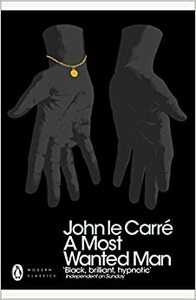Take a photo of a barcode or cover
This review reveals more about my limitations than the quality of this book. I had a hard time keeping up with all of the characters and their individual motives. Still enjoyable. That's why I said 'I liked it' but not as satisfying as it would have been to me if I'd been better able to follow the plot.
Although I'm not well-versed in the espionage genre, I couldn't help thinking le Carre is in desperate need of an editor. His descriptive writing lacks dimension and the character dialogues are contrived and unbelievable. I understand vintage le Carre is a better place to start with the genre, so I'll refrain from total judgment. That said: the plot is interesting, entertaining and concludes in an unexpected final scene.
I absolutely love reading a le Carre story. I really enjoy the characters he crafts, but for me the best part of his stories are the meticulously crafted scenarios and machinations that the characters put together.
mysterious
slow-paced
Decent enough thriller from the master that focuses mostly on the targets of spies rather than the spies themselves. Tommy Brue a runs a failing private bank in Hamburg, Germany. A lawyer Annabel Richter called regarding a client, Issa. Issa believes he has a claim to an account in a bank. A very secret account that True had very little to do with as it was set up by his father, who previously rand the bank, and he was told very little about it. Issa is the son of a Chechyan woman and a Russian general, in his relatively short (mid 20s life), he has been tortured in three different countries. He insists on his innocence and one is inclined to believe him. He has come to Hamburg by being illegally smuggled to Sweden and then to Germany. He has 500 hundred dollars in a toke around his neck as well as a key. He is a devout Muslim that somehow is blissfully unaware of various aspects of Islamic observance and he has clearly been traumatized by his various imprisonments. Richter is the lawyer daughter of a family of very rich, very well-connected and very amoral lawyers. In rebellion, she works for a non-profit that tries to help undocumented immigrants. Their budget is less than zero. All three take a shine to each other.
Unfortunately, Issa has managed to get the attention of a hodgepodge group of spies from various countries who see him as a key to infiltrating terror networks. The most prominent is Gerard Bachmann, a master of asset recruitment, who runs his own unit and is old school in the sense that he works the long game. He spends most of the time in the novel protecting his turf while dangling Issa for bigger game.
The Brits have an eye for Issa as well for completely different reasons and part of the interest of the novel are those competing interests and how they play out.
LeCarre being a) a master and b) a resigned cynic posits the heart of the novel in how quickly and efficiently the various spies can turn their assets towards their desires. This is the sadness that permeates the book as we see how optimism can be worn down to accommodation.
This is not the best LeCarre and it doesn't go down as smoothly as his other works. It's a little bumpy. And the ending throws a curveball that is more like an acidic swipe at a particular major democratic country's laissez faire attitude towards the rights they claim to espouse. It seems almost like an afterthought than a puzzle piece in this fairly complex novel.
Good LeCarre, not great LeCarre.
Unfortunately, Issa has managed to get the attention of a hodgepodge group of spies from various countries who see him as a key to infiltrating terror networks. The most prominent is Gerard Bachmann, a master of asset recruitment, who runs his own unit and is old school in the sense that he works the long game. He spends most of the time in the novel protecting his turf while dangling Issa for bigger game.
The Brits have an eye for Issa as well for completely different reasons and part of the interest of the novel are those competing interests and how they play out.
LeCarre being a) a master and b) a resigned cynic posits the heart of the novel in how quickly and efficiently the various spies can turn their assets towards their desires. This is the sadness that permeates the book as we see how optimism can be worn down to accommodation.
This is not the best LeCarre and it doesn't go down as smoothly as his other works. It's a little bumpy. And the ending throws a curveball that is more like an acidic swipe at a particular major democratic country's laissez faire attitude towards the rights they claim to espouse. It seems almost like an afterthought than a puzzle piece in this fairly complex novel.
Good LeCarre, not great LeCarre.
This was a tough book to review, so I had to step away for a bit, think about how I felt about the book ... and then we had our book club meeting, so I listened to what other people thought about it, stepped away again, and now I'm finally writing about it.
I like the other le Carré-based works with which I'm familiar (the book The Perfect Spy and the movie The Constant Gardner), so I thought this would be similar when I picked it up in the clearance section at Half Price Books. Ah, what I didn't know ... I should have trusted the bookstore.
It's one of le Carré's newest books, and as such, it's markedly different from the other titles I know about. This is about post-9/11 spying, and as such, it does two things: it paints a grimly realistic picture of how those games are played today, and it makes you take a look back at Cold War-era spy books and wonder if perhaps that was what was happening all the time then, too. (You're thinking James Bond, right? Remember, in the movies, he plays everyone, and is played himself frequently. We want to see him as the good guy, but he has an odd way of going about things, and of course innocent people always get swept up in his wake. Plus Ian Fleming's Bond was darker than the movie Bond.)
Part of that realism is the ham-handed way Americans deal with "terrorism" internationally. It's not hard to reconcile that with what we've read in the papers over the last 11 years or so, and. The lack of subtlety and the "Our way is how it goes down" approach the Americans take in the book is much like what we know to be true; it is, however, a difficult pill to swallow when you realize what that means, that we, normal American people, are occasionally seen that way by people in other countries. (And why not? Those are, after all, the people with the biggest impact on their lives.)
So.
The book is well-written and interesting ... but it's about a topic that isn't nearly as romantic and intriguing as it was, say, 30 years ago. Think about reading The Jungle within a decade after Sinclair wrote it. Would you become a vegetarian on the spot? You just might. Unfortunately, citizenship isn't easy to change ... and government is even harder to change. Two presidents with nearly polar opposite approaches to most other things seem to see no problems reaching over into other countries and doing as they see fit. With that in mind, could individual spies be expected to act any differently?
I like the other le Carré-based works with which I'm familiar (the book The Perfect Spy and the movie The Constant Gardner), so I thought this would be similar when I picked it up in the clearance section at Half Price Books. Ah, what I didn't know ... I should have trusted the bookstore.
It's one of le Carré's newest books, and as such, it's markedly different from the other titles I know about. This is about post-9/11 spying, and as such, it does two things: it paints a grimly realistic picture of how those games are played today, and it makes you take a look back at Cold War-era spy books and wonder if perhaps that was what was happening all the time then, too. (You're thinking James Bond, right? Remember, in the movies, he plays everyone, and is played himself frequently. We want to see him as the good guy, but he has an odd way of going about things, and of course innocent people always get swept up in his wake. Plus Ian Fleming's Bond was darker than the movie Bond.)
Part of that realism is the ham-handed way Americans deal with "terrorism" internationally. It's not hard to reconcile that with what we've read in the papers over the last 11 years or so, and
Spoiler
the climax of the book is all too easy to see: the Americans, after openly seething during a strategy meeting, storm in, shatter the carefully-laid plans of the Europeans, and sweep off their victims for extraordinary renditionSo
Spoiler
the ending was difficult for me to read, and right away, I found it to be disappointing. Did it have to end that way? Yes, for le Carré to make his point, it didThe book is well-written and interesting ... but it's about a topic that isn't nearly as romantic and intriguing as it was, say, 30 years ago. Think about reading The Jungle within a decade after Sinclair wrote it. Would you become a vegetarian on the spot? You just might. Unfortunately, citizenship isn't easy to change ... and government is even harder to change. Two presidents with nearly polar opposite approaches to most other things seem to see no problems reaching over into other countries and doing as they see fit. With that in mind, could individual spies be expected to act any differently?
I do love le Carré. His characters are not cardboard cut action heroes but human he makes you care about. The way his stories deal with moral and political issues is thoughtful and nuanced.
I do however wish he would stop breaking our hearts on the last page, like he has been doing for the past 30 years.
I do however wish he would stop breaking our hearts on the last page, like he has been doing for the past 30 years.
John Le Carre’s spy fiction certainly feels real.
It feels as though I am reading about real people in a very real, very scary world, where idealism butts against hard realities and where smart battles stupid and suddenly realizes stupid often prevails.
Le Carre made his name as a spy writer with his excellent Cold War novels featuring George Smiley, and these are very good examples of the genre. My favorite from these earlier works, thus far, anyway, is “The Honourable Schoolboy,” with a sometimes-agent hot on the trail of a Soviet spy paymaster. As with all of Le Carre’s books, you get an intimately detailed look at the politics and minutia that fuel the intelligence world, and it feels like you are being immersed in it. Whether it is a truly accurate depiction of the inside works of the espionage world or not, it all seems convincing.
As good as his Cold War books are, though, Le Carre’s later novels appeal to me more. The Cold War days seem distant to me, like I am reading history — which, of course, to an extent I am. But when he applies his themes of deception and betrayal to events that I read about in the daily news, I am engrossed. The war on terror, especially, is a fertile field for Le Carre’s intricate webs.
I ended 2016 by reading “A Most Wanted Man,” in which a mysterious figure from Chechnya, named Issa, plops into the lives of a Muslim woman and her son in Hamburg. He has been a political prisoner. He may, or may not, have participated in terrorist or rebellious activities. He has a legacy left him, and a chance at freedom and a good life, but he must first collect that legacy while spies from three nations track his every move.
He has the aid of an idealistic young German attorney, and she helps him connect with a British banker in Hamburg who has the key to Issa’s fortune. They conduct their business while drawing much attention from intelligence agents who, as it turns out, are playing a bigger game.
What really makes the book tick, aside from all the excellent and mysterious cloak-and-dagger stuff, is the portrayal of the non-spy characters. These people are expertly depicted. They have qualities and flaws, goals and secrets. They do things for the same reasons people do things in the real world, and sometimes they even know they are being foolish, but damn it, they are going to do the foolish thing anyway — maybe because it is the right thing to do, maybe to express love for an unobtainable woman, maybe to make amends for a father’s crimes. These are humans being human, and as such they are prey and fodder in a world of governments playing deadly games.
The spies are real people, too, of course. Some play a long game, some seek quick successes. The wishes of one government collide with the desires of another, and political aims threaten long-laid plans.
And through it all, lives may be ruined or rewarded, and merit or blame seldom have anything to do with it.
Le Carre’s feelings about Western intelligence methods and goals come through plainly enough. American cowboy-style espionage, in particular, comes off badly. Some readers may feel he is barking up a wrong tree. But most, I think, will emerge thinking more deeply about prejudice and bias, and about the complexities of the modern world.
And most, I think, will read on hoping things turn out well for characters they have come to know. And because Le Carre does not sugar-coat anything, you never know until the end. And sometimes not even then.
It feels as though I am reading about real people in a very real, very scary world, where idealism butts against hard realities and where smart battles stupid and suddenly realizes stupid often prevails.
Le Carre made his name as a spy writer with his excellent Cold War novels featuring George Smiley, and these are very good examples of the genre. My favorite from these earlier works, thus far, anyway, is “The Honourable Schoolboy,” with a sometimes-agent hot on the trail of a Soviet spy paymaster. As with all of Le Carre’s books, you get an intimately detailed look at the politics and minutia that fuel the intelligence world, and it feels like you are being immersed in it. Whether it is a truly accurate depiction of the inside works of the espionage world or not, it all seems convincing.
As good as his Cold War books are, though, Le Carre’s later novels appeal to me more. The Cold War days seem distant to me, like I am reading history — which, of course, to an extent I am. But when he applies his themes of deception and betrayal to events that I read about in the daily news, I am engrossed. The war on terror, especially, is a fertile field for Le Carre’s intricate webs.
I ended 2016 by reading “A Most Wanted Man,” in which a mysterious figure from Chechnya, named Issa, plops into the lives of a Muslim woman and her son in Hamburg. He has been a political prisoner. He may, or may not, have participated in terrorist or rebellious activities. He has a legacy left him, and a chance at freedom and a good life, but he must first collect that legacy while spies from three nations track his every move.
He has the aid of an idealistic young German attorney, and she helps him connect with a British banker in Hamburg who has the key to Issa’s fortune. They conduct their business while drawing much attention from intelligence agents who, as it turns out, are playing a bigger game.
What really makes the book tick, aside from all the excellent and mysterious cloak-and-dagger stuff, is the portrayal of the non-spy characters. These people are expertly depicted. They have qualities and flaws, goals and secrets. They do things for the same reasons people do things in the real world, and sometimes they even know they are being foolish, but damn it, they are going to do the foolish thing anyway — maybe because it is the right thing to do, maybe to express love for an unobtainable woman, maybe to make amends for a father’s crimes. These are humans being human, and as such they are prey and fodder in a world of governments playing deadly games.
The spies are real people, too, of course. Some play a long game, some seek quick successes. The wishes of one government collide with the desires of another, and political aims threaten long-laid plans.
And through it all, lives may be ruined or rewarded, and merit or blame seldom have anything to do with it.
Le Carre’s feelings about Western intelligence methods and goals come through plainly enough. American cowboy-style espionage, in particular, comes off badly. Some readers may feel he is barking up a wrong tree. But most, I think, will emerge thinking more deeply about prejudice and bias, and about the complexities of the modern world.
And most, I think, will read on hoping things turn out well for characters they have come to know. And because Le Carre does not sugar-coat anything, you never know until the end. And sometimes not even then.



